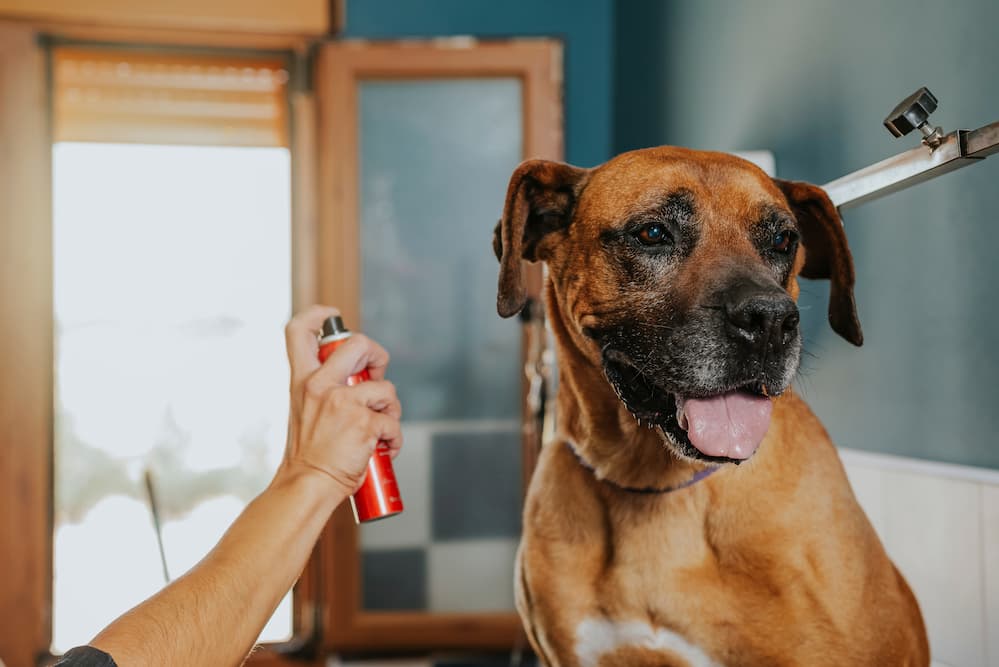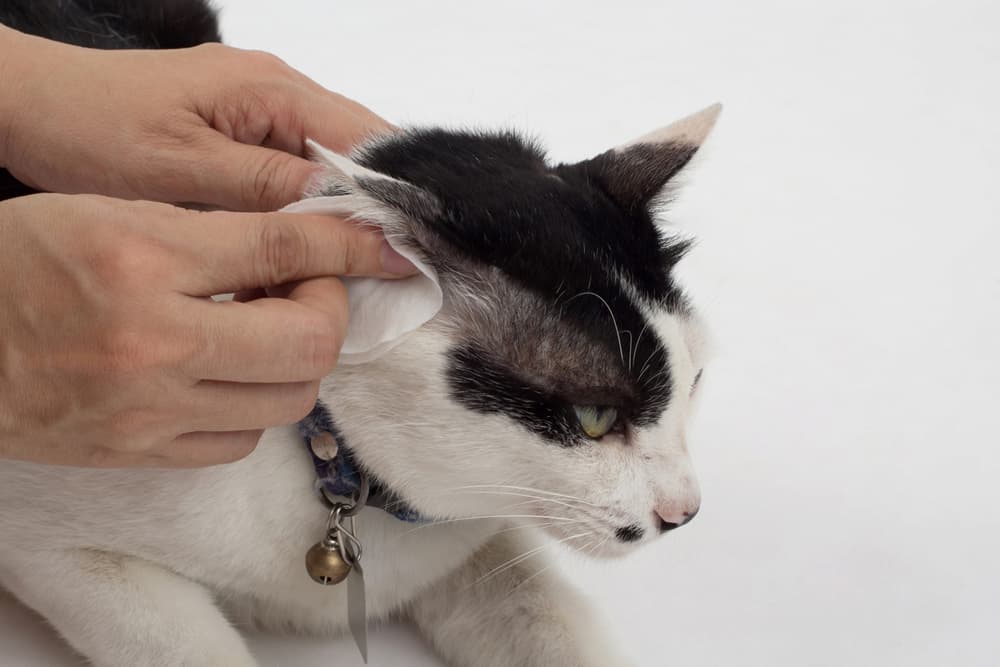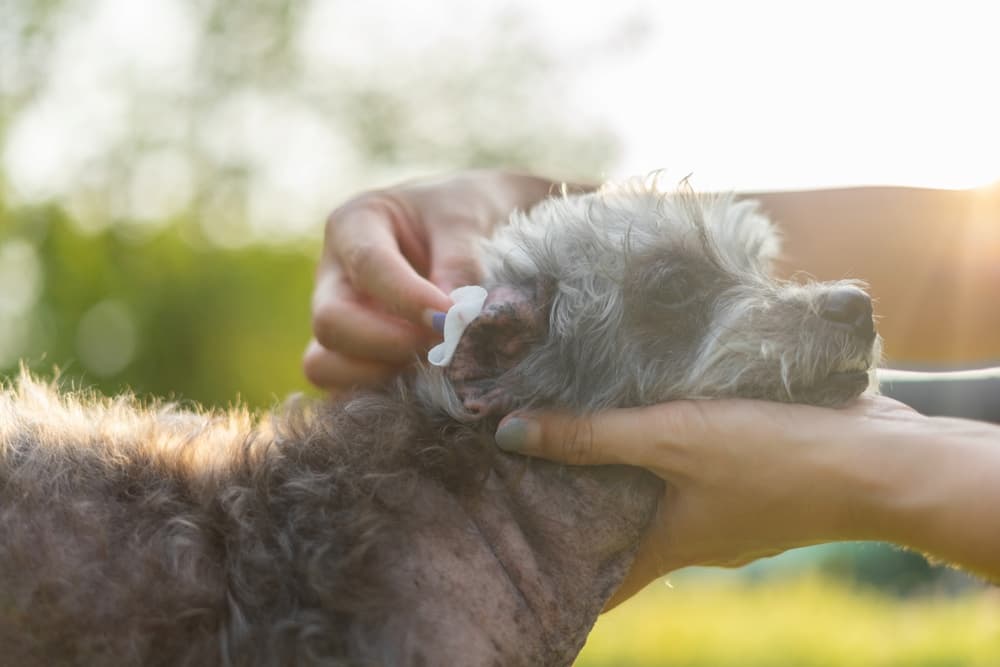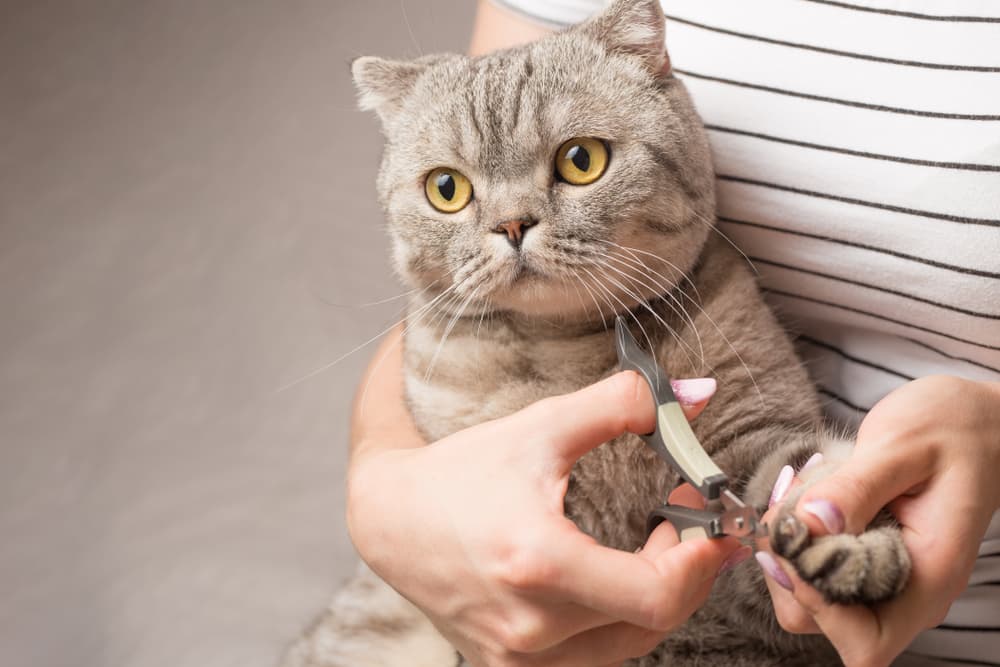Best Dog Toothpaste: Veterinarians Share Their 5 Top Picks
Updated on November 18, 2024
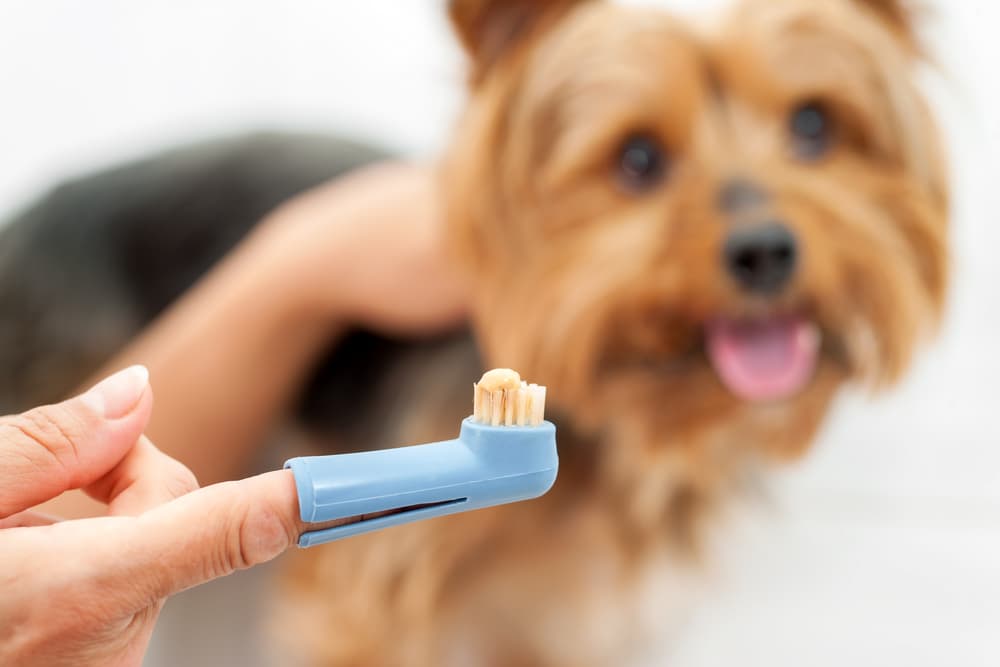
Every day as humans, we brush our teeth at least twice a day to prevent ourselves from getting cavities. But what about our dogs? Chances are, you can’t remember the last time you brushed your pup’s teeth. In fact, one poll found that only 8 percent of owners brush their dog’s teeth every day.
But brushing a dog’s teeth is incredibly important to overall health, and finding the best dog toothpaste can help prevent tartar, gingivitis, inflammation, and periodontal disease. We asked veterinarians to share their top toothpaste picks for our pets.
Our Top Toothpaste Picks for Dogs
All featured products are chosen at the discretion of the Vetstreet editorial team and do not reflect a direct endorsement by the author. However, Vetstreet may make a small affiliate commission if you click through and make a purchase.
- Best Overall: Virbac C.E.T. Enzymatic Toothpaste
- Best for Plaque: PetSmile Professional Pet Toothpaste
- Best for Bad Breath: Arm & Hammer Dental Fresh Breath Enzymatic Dog Toothpaste
- Best Budget Option: Sentry Petrodex Advanced Enzymatic Flavor Dog Toothpaste
- Best Flavor Options: Well & Good Tartar Control
Best Dog Toothpaste: 5 Veterinarian Recommendations
Best Overall Dog Toothpaste
Our Pick: Virbac C.E.T. Enzymatic Toothpaste
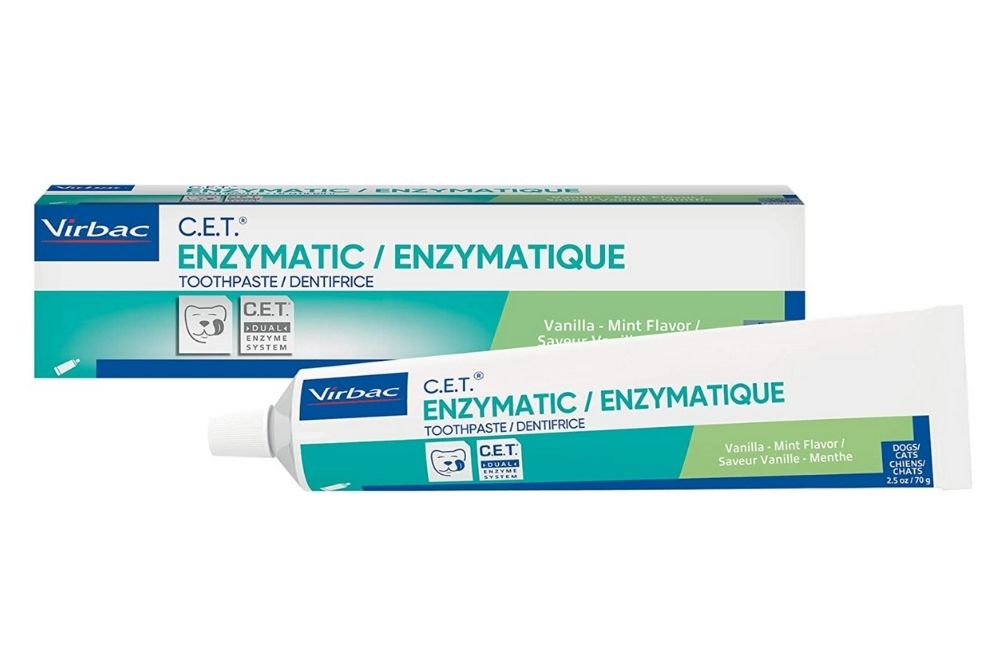
Most of the veterinarians we spoke with recommended this pet toothpaste. Miller, for example, said that she has used it in her veterinary practice. Conrad called it “a great dental line.” And Simon said, “I am personally a big fan of [it] as clients have reported back that their pets enjoy the flavor and I feel I’ve seen results in practice in those who use it continually.”
The toothpaste is US-manufactured, one of the few options on this list that is actually safe for dogs and cats alike, and contains a dual enzymatic formula that is designed to kill bacteria, remove plaque, prevent the formation of tartar, and combat your pup’s bad breath.
Highlights
- Available in three dog-friendly flavors: poultry, beef, and vanilla mint.
- Free of foaming agents.
- Provides a deep, safe clean.
Things to Consider
- It’s brown in color, so it can stain white fur.
- Expires if not used quickly.
Best Dog Toothpaste for Preventing Plaque Buildup
Our Pick: PetSmile Professional Pet Toothpaste
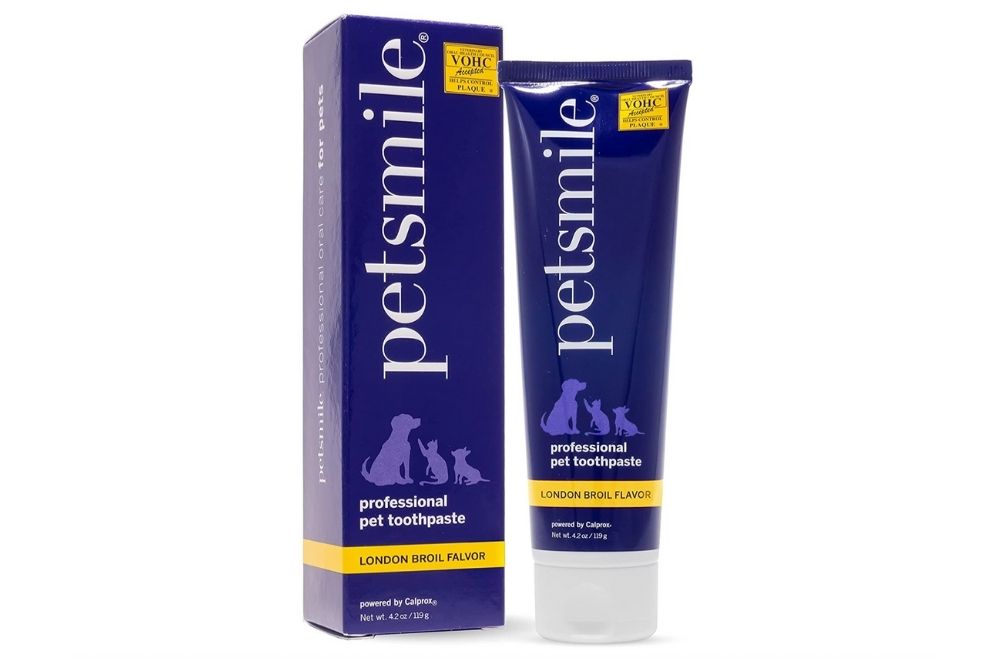
PetSmile Professional toothpaste is a little more expensive than some of the other products on this list, but it also comes highly recommended by Jamie Whittenburg, veterinarian and owner of the Kingsgate Animal Hospital in Texas, because it works really well at preventing plaque buildup.
“This paste comes in three dog-pleasing flavors and carries the VOHC Seal of Approval, [which] means that the product met VOHC’s Standards for effectiveness in retarding plaque and tartar”, she says. “[And] my clients have reported to me that it is working well for their dogs.”
Highlights
- Available in three dog-friendly flavors: Cheese, Rotisserie Chicken, London Broil.
- Sold in large 4.2-ounce tubes to last longer.
- Whitening and cleansing.
- Has VOHC Seal of Approval.
Things to Consider
- Pricier than other toothpastes on this list.
Best Dog Toothpaste for Bad Breath
Our Pick: Arm & Hammer Dental Fresh Breath Enzymatic Dog Toothpaste
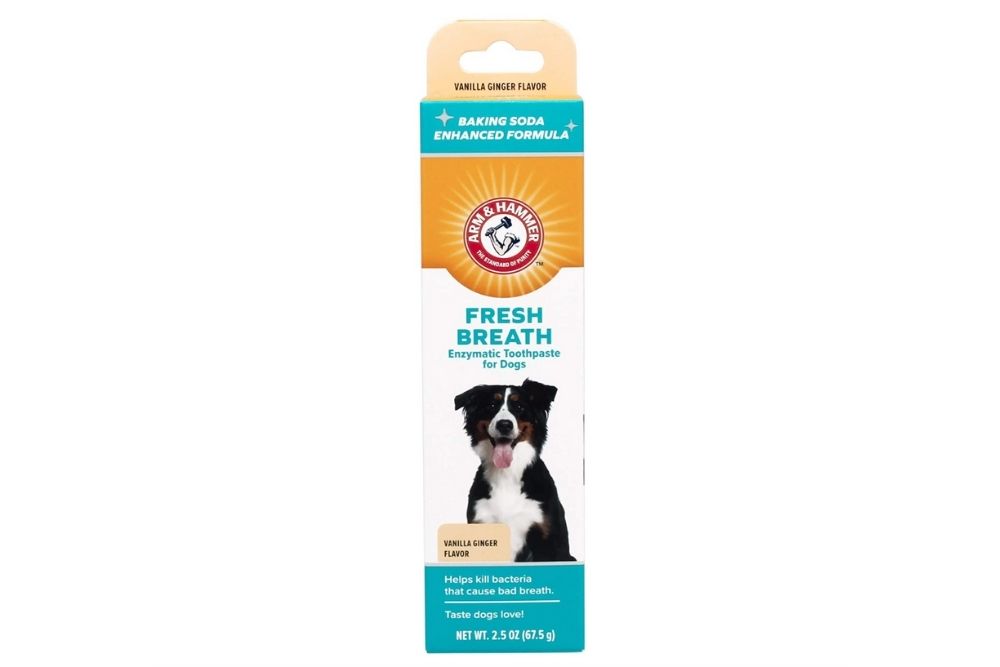
This is one of the dog toothpastes that Conrad says she’s used herself with dogs—and the good news is that it’s very easy to find in a whole range of pet stores. In fact, some stores even sell it as a kit with a toothbrush for humans that want to buy both products together.
Not only does this toothpaste safely clean your dog’s teeth, but because it has baking soda, it will also freshen their breath and whiten their teeth at the same time.
Highlights
- Easy to find in a range of stores.
- Freshens breath.
- Whitens teeth.
Things to Consider
- Some dogs don’t like the flavor.
- Comes in a smaller tube than other brands.
Best Budget Canine Toothpaste
Our Pick: Sentry Petrodex Advanced Enzymatic Flavor Dog Toothpaste
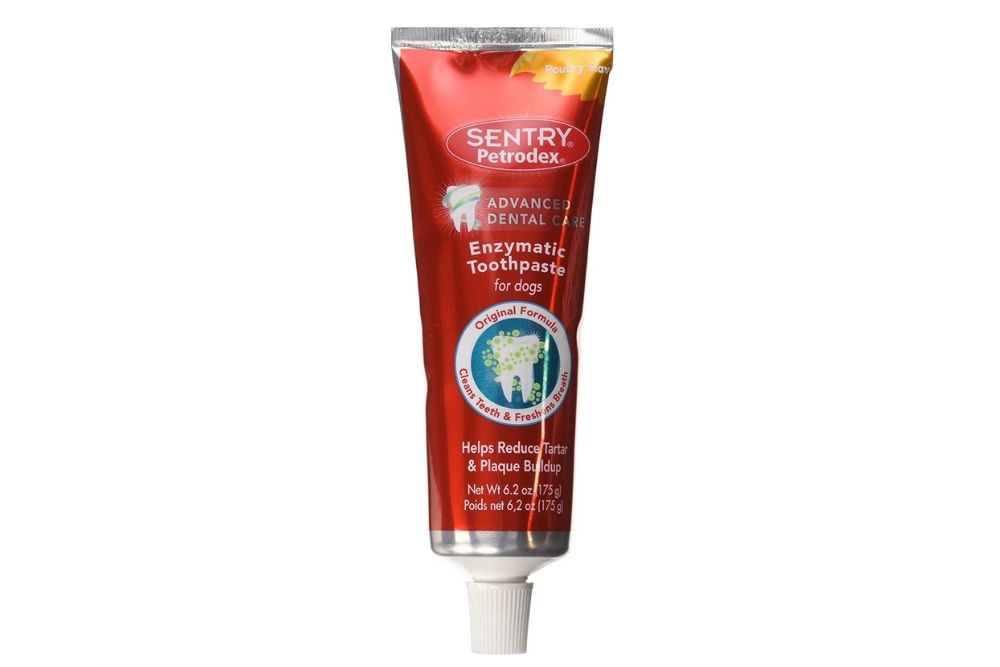
Toothpaste for your dog doesn’t have to be super expensive to be effective and this one helps control plaque and bad breath without costing you a lot of money. This one is recommended because it’s got the rave user reviews online to back it up. It’s available in two sizes, but even the 6.2oz tube is more affordable than many of the other toothpastes on this list. Plus, it’s poultry-flavored so if your furry best friend likes chicken, they might not mind the taste.
Highlights
- Affordably priced.
- Large tube size available to last a long time.
- Very effective with regular use.
- Safe if swallowed.
Things to Consider
- Smell bothers some human owners.
- Needs to be stored in a dry place.
Best Dog Toothpaste for Flavor Options
Our Pick: Well & Good Tartar Control
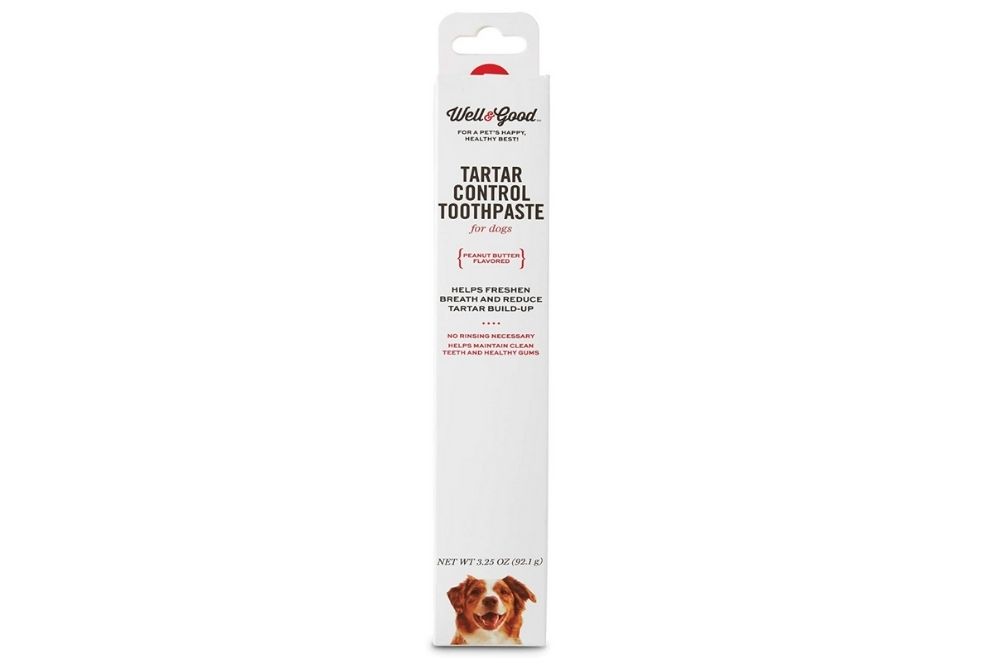
Miller likes Well & Good Tartar Control Toothpaste because it is a pet-safe toothpaste that is “flavored to be interesting to pets to help keep them happy while having their teeth brushed.”
This toothpaste is available in chicken, peanut butter, and vanilla flavors—and you can even get a special puppy formula that is pH balanced for young dogs. It’s also one that you can pick up as a kit with a toothbrush.
Highlights
- Wide range of flavors and options.
- Large tube.
- Balances pH.
- Can be bought as a kit.
Things to Consider
- Not an enzymatic formula.
- Formula changed recently and some dogs aren’t happy.
How to Check Your Dog’s Oral Health From Home
If you’d like to determine the state of your dog’s oral health, consider the Embark Oral Health Test Kit. If your dog has bad breath, tooth decay, or other oral issues, this test can help evaluate what’s going on.
After receiving the test kit in the mail, you simply swab your dog’s gumline and return the specimen in the postage-paid envelope. Within 2 to 3 weeks, results will arrive in your email inbox. The best time to collect the sample is in the morning, as food particles after meals can make the results less accurate.

Using DNA sequencing, Embark identifies the proportions of all bacteria living in your dog’s mouth. That gets compared to a healthy reference as a comparison. The report will tell you all about your dog’s oral microbiome, such as if there is an imbalance, any periodontal disease associates, and more.
Pet parents receive supplement and retesting recommendations to help improve their dog’s oral microbiome. The report is extremely thorough and a valuable asset for your dog’s overall oral health.
Can I Make My Own Dog Toothpaste at Home?
In general, it is both safer and easier to just buy a dog toothpaste than it is to make one at home. Most recipes available online may not be very effective—and not all sources can be trusted.
“If you want to make your own [dog toothpaste], I would run the ingredients by your vet to make sure they are all safe,” says Conrad. “There are some recipes out there that are coconut-oil based, which is OK for some dogs but can cause diarrhea in others.”
So, she adds, “use caution about what ingredients you use and if you see any gastrointestinal upset, you should stop immediately.”
In fact, if you’re out of toothpaste for some reason, most vets would prefer you just use a brush with water rather than make your own concoction.
Understanding Dog Dental Problems
Before we talk toothpaste, it’s important to understand why dog dental care is important. The truth is, dogs are just as susceptible to dental disease as we are. In fact, in the United States, around 80 percent of adult dogs are affected by dental diseases—the most common being periodontal disease.
“Periodontal disease is the gradual damage and destruction of the gums, bones, and other structures that surround the teeth,” says Jacqueline Brister, Ohio veterinarian and consultant for Embrace Pet Insurance. “It is caused by infection and inflammation of these structures because of plaque and tartar development on the teeth.”
Over time, periodontal disease will not only cause your dog pain (and bad breath!), but it can also affect your pup’s ability to eat (as they lose teeth) or lead to other illnesses, such as kidney, heart, or liver disease.
That’s why routine dental care—which includes regular brushing at home and vet checkups— is so important to your dog’s health and wellbeing.
“While daily brushing is ideal, pet parents should aim to brush their dog’s teeth at least 1-2 times per week,” says Whitney Miller, chief veterinarian at Petco.
How to Brush Your Dog’s Teeth
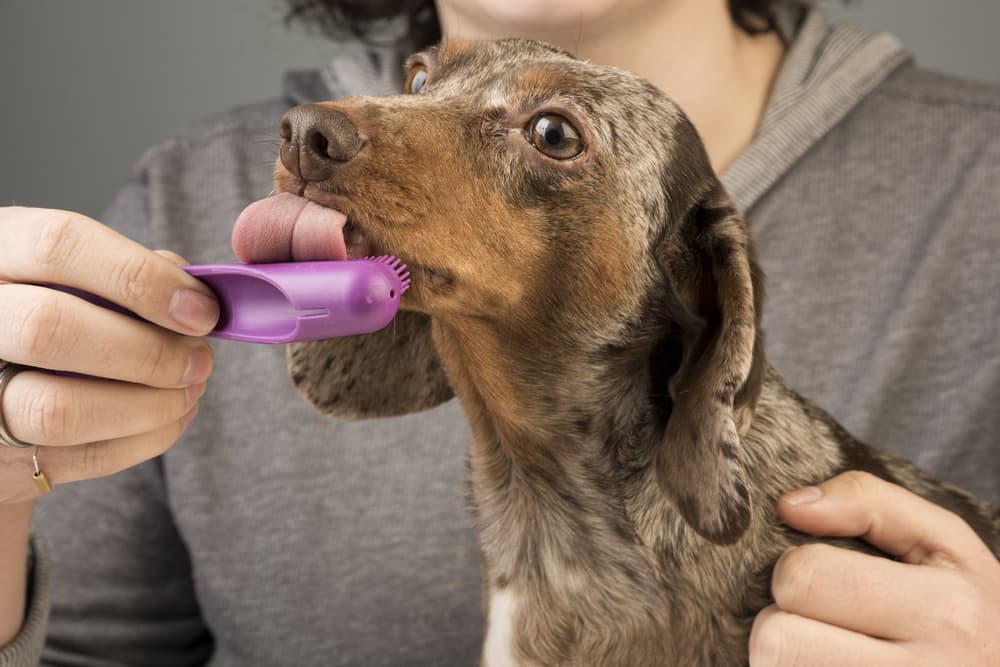
If possible, says Linda Simon, veterinary surgeon, try to start brushing your dog’s teeth from puppyhood so you can get them used to it. But you can get an older dog comfortable with the process too. Just start slowly so you don’t scare your dog or hurt them.
“Build up slowly to brushing so that it can be enjoyable,” says Brister. “Start with massaging around the mouth, then rubbing your finger over their gums. Offer treats and encouragement [and] allow them to taste the toothpaste in very small amounts by rubbing it gently over their teeth or gums with your finger.”
“Eventually, you should be able to build up enough trust to actually brush their teeth using a doggy toothbrush and dog-formulated toothpaste,” she continues, so that you can get those back molars.
Can I Use Human Toothpaste On My Dog?
No, you shouldn’t use your own toothpaste when brushing your dog’s teeth.
“Dogs can’t really be trained to spit, so anything that goes in their mouths could get swallowed,” explains Brister. “Human oral health toothpaste contains a lot of things that aren’t meant to be swallowed, like baking soda and hydrogen peroxide.”
Human toothpaste also contains some additives that could actually be harmful or even toxic to your dog, such as fluoride (which can upset your dog’s stomach), high-foaming detergents, abrasives, or xylitol, which is toxic.
“Xylitol is an artificial sweetener used in human sweets,” explains Megan Conrad, an Oregon veterinarian working with the telehealth company Ralphie. It can cause blood sugar drops, liver damage, or be fatal.
Dog Toothpaste Shopping Tips
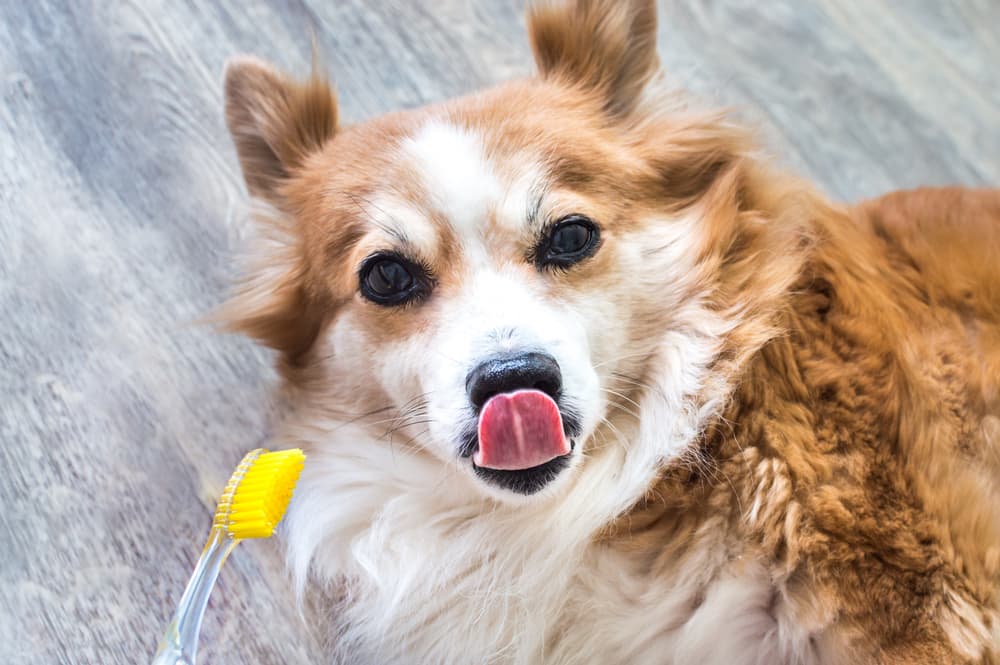
There are lots of dog toothpaste products on the shelves. Here are a few tips for narrowing down the selections to the best of the best.
Shop at a Pet Store
Although it may seem obvious, make sure to look for dog toothpaste at a pet store or an online pet retailer. Large pet store retailers usually do their research to make sure they’re only selling items—like dog toothpaste—that are safe for your pet. If it’s labeled for dogs and made by a reputable brand, odds are it’s safe for them to swallow.
Check the Ingredients
Still, you’ll want to read the ingredients on any toothpaste you choose to make sure it’s not made with alcohol (which is abrasive), artificial sweeteners, or fluoride. Most dog toothpastes are, instead, made with enzymes which make it harder for bacteria, plaque, and tartar to build up.
Look for the VOHC Seal of Approval
You can also check to see if the product has received the Veterinary Oral Health Council (VOHC) seal of approval. There are many toothpastes that don’t have the VOHC that are still safe and effective, but the ones that do have gone through extra testing.
“The products recommended on [the VOHC] website have been reviewed using clinical trials that were conducted with a set of specific standards and guidelines,” explains Brister. “These types of trials provide the most accurate information on whether plaque or tartar can actually be prevented using the tested product.”
Pick a Flavor Your Pup Will Tolerate
Dog toothpaste comes in a variety of flavors—from beef to bacon to peanut butter. But the “best” flavor for your dog will ultimately depend on what your dog likes or doesn’t like.
“While some dogs enjoy mint flavor (which helps freshen breath), most prefer a toothpaste that tastes like meat,” says Simon. You might need to try a few before figuring out what will work.
Bear in mind, though, that some flavors might be appetizing for your dog but not smell great to you (think: “bacon breath”). If you’re unsure what smell won’t bother you and what your dog might like, you can opt to try a toothpaste that has little to no taste at all.



